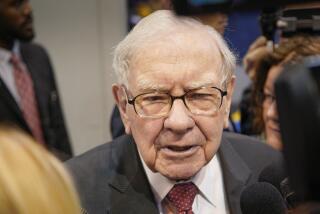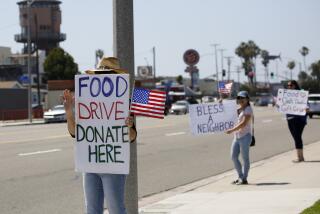Faith, Hope and Charities
- Share via
Historically, economic upturns have reinvigorated gift-giving in America. But a Gallup Poll released last week suggests that in 1995, a year of economic resurgence, the percentage of households giving anything to charity stood at its lowest point since 1988. The numbers, alas, represent a fundamental lack of public faith in the charities themselves.
Households that gave declined four percentage points over three years--from 73% in 1993 to 69% in 1995. Furthermore, there has been a dramatic increase in the percentage of Americans disagreeing with this statement posed by Gallup: “Most charitable organizations are honest and ethical in their use of funds.” Only 20% of those polled expressed such distrust in 1990. This year the number was 31%.
Anti-charity movements are spreading through several states, including Maine, which is caught up in an effort to impose taxes on once-exempt nonprofit summer camps. The anti-charity fervor is most strident in Colorado, where voters are now considering Amendment 11, a November ballot initiative that would eliminate traditional property tax exemptions for most charitable organizations.
The initiative currently has a slight edge in opinion polls, and that’s of no small concern to Coloradans like Denver’s Father Jim Brennan, a Roman Catholic priest whose parish and church school derive most of their income from charity. “We’re fighting for our life,” says Brennan. “Should the initiative pass, we will have to close both the church and the school.”
How can the nonprofits fight back? One strategy is to recognize that because many Americans simply don’t trust institutions of any kind, they do not make the effort to contact charities and then make donations. The Gallup Poll suggests that charities can overcome this by making personal face-to-face appeals to donors. When people are personally asked for money, the poll showed, 85% give; when not directly approached, only 44% give.
“It is imperative that charities reach out to under-asked populations,” said Sara E. Melendez, president of Independent Sector, a nonprofit coalition that requested the Gallup Poll. “The under-asked, particularly minorities and young people, have an extraordinary response rate. When minorities are asked to give, 78% do; when not asked, only 28% give.”
The poll’s most surprising finding was that poor households were by far the most generous charity givers relative to income. Contributing households with incomes under $10,000 gave an average of 4.3% of their income to charity, while households with $40,000 to $50,000 gave 1.3%. Those with incomes over $100,000 gave 3.4%.
A sponsor of the Colorado initiative is John Murphy, a radio talk show host who argues that churches can afford property taxes because “God is not broke.”
The poor surely have no better insight into the divine bank account than anyone else, so it’s possible that their relative generosity stems from knowing firsthand how it feels to live on the edge.
We’d like to think it wouldn’t take that.
More to Read
Sign up for Essential California
The most important California stories and recommendations in your inbox every morning.
You may occasionally receive promotional content from the Los Angeles Times.













